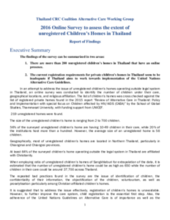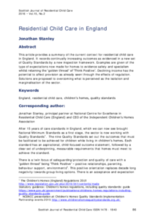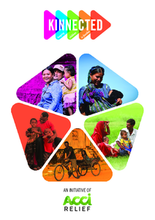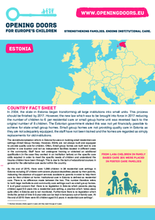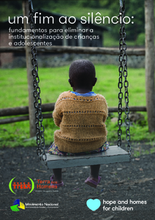Displaying 1041 - 1050 of 1510
This document is a report on the 2016 Online Survey of Unregistered Children’s Homes in Thailand. This report found that there are more than 200 unregistered children’s homes in Thailand that have an online presence, and the current registration requirements for private children’s homes in Thailand seem to be inadequate if Thailand aims to work towards implementation of the United Nations Alternative Care Guidelines.
This article provides a summary of the current context for residential child care in England. It records continually increasing outcomes as evidenced in a new set of Quality Standards by a new inspection framework.
This short video by ChildSafe in Cambodia explains how donations to orphanages, rather than helping the situation, often cause the creation of more orphans. It is estimated that about 80% of the 8 million children living in institutions around the world are not actually orphans. Donations to orphanages only fuel the orphanage industry further, so the focus should instead be on supporting families.
This chapter from Global Perspectives is a discussion of child protection, care, welfare, and residential care in Greece. This chapter covers a brief historical overview of the child protection and care situation in Greece, as well as a discussion of care and protection of children in contemporary Greece. There is a case study included of “The Smile of the Child” foundation.
Kinnected is a program run in 10 countries by the organization ACCI Relief aimed at preserving and strengthening families and assisting children currently in residential care to achieve their right to be raised in a family. This report describes Kinnected’s programs and initiatives underway in Cambodia, Sri Lanka, and Lesotho and includes some individual case studies.
In this chapter from Residential Child and Youth Care in a Developing World: Global Perspectives, First Edition Faizah Haji Mas’ud discusses the state of residential care in Malaysia. Mas’ud covers Malaysia and welfare policy, types of children’s services, as well as challenges and issues Malaysia faces in providing residential care to children.
This Estonia Country Fact Sheet highlights the transformations made in deinstitutionalization in Estonia since 2004. By the end of 2015, there were 1,068 children in 38 residential care settings in Estonia.
In this chapter of Residential child and youth care in a developing world: Global perspectives, First Edition, the reader is introduced to residential care in Ghana.
This study revealed, through their narrations, the changes in the lived experiences of children who resided in residential childcare services regarding the going home process in a Chinese context.
Décadas de pesquisas comprovam que o crescimento em instituições de acolhida gera consequências psicológicas, emocionais e físicas, incluindo transtornos de apego, atrasos cognitivos e no desenvolvimento, e uma falta de habilidades sociais e de competências para a vida, trazendo diversas desvantagens na idade adulta.

